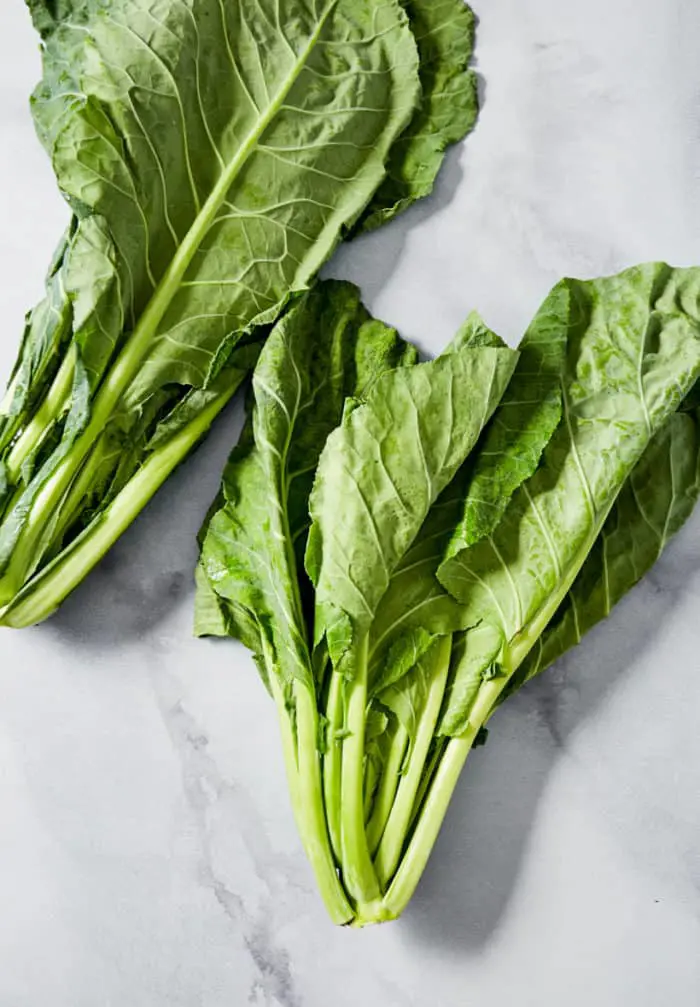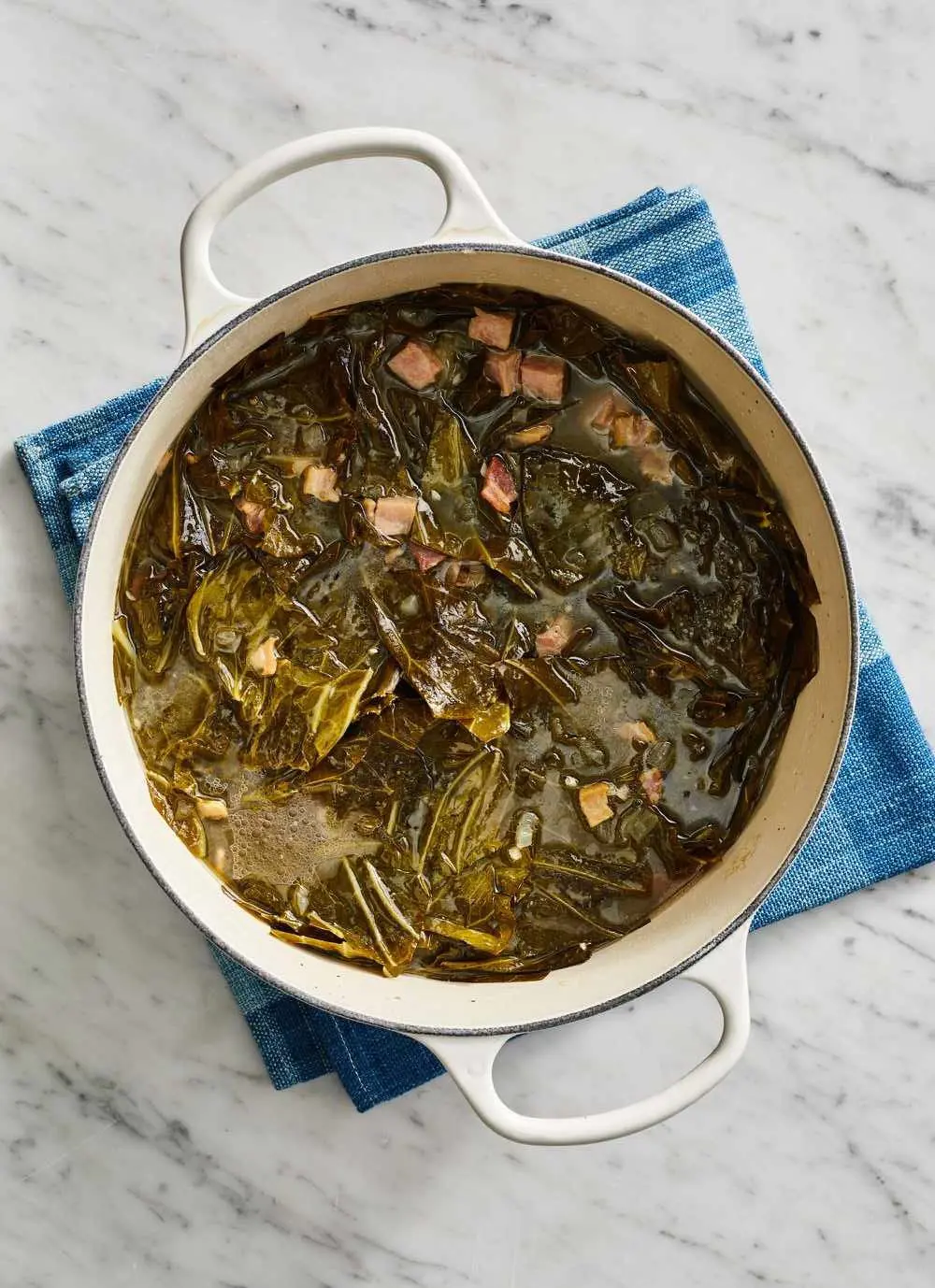Collard Greens Nutrition and 20 Health Benefits

Packed with vitamins, minerals, and antioxidants, collard greens offer more than just taste. They might even help lower your risk of certain health problems when eaten regularly. If you're not familiar with collard greens or want to learn more about their benefits, you're in the right place.
This guide will cover everything you need to know about this healthy vegetable, from collard greens nutritional value to its potential health perks. Let's explore the world of collard greens!
Collard Greens Nutritional Facts
Collard greens are a healthy eater's dream. These leafy greens are packed with goodness: They're one of the best sources of vitamin C, rich in vitamin K and fiber, and nutrients in collard greens may help fight cancer.
Here are collard greens nutritional information, in one cup of chopped collard greens (about 190 grams), you'll get:
- Calories: 62.7
- Total Carbohydrates: 10.7 g
- Fiber: 7.6 g
- Sugar: 0.8 g
- Total Fat: 1.4 g
- Saturated Fat: 0.1 g
- Polyunsaturated Fat: 0.3 g
- Monounsaturated Fat: 0.05 g
- Trans Fat: 0 g
- Protein: 5.2 g
- Sodium: 28.5 mg (1% DV)
- Vitamin B6: 0.2 mg (12% DV)
- Iron: 2.2 mg (12% DV)
- Vitamin E: 1.7 mg (11% DV)
- Copper: 0.1 mg (11% DV)
- Magnesium: 39.9 mg (10% DV)
- Vitamin K: 773 mcg (644% DV)
- Vitamin A: 722 mcg (80% DV)
- Manganese: 1 mg (43% DV)
- Vitamin C: 34.6 mg (38% DV)
- Calcium: 268 mg (21% DV)
- Riboflavin: 0.2 mg (15% DV)
- Folate: 30.4 mcg (8% DV)
- Thiamine: 0.1 mg (8% DV)
- Pantothenic Acid: 0.4 mg (8% DV)
- Niacin: 1.1 mg (7% DV)
- Phosphorus: 60.8 mg (5% DV)
- Potassium: 222 mg (5% DV)
Benefits of Collard Greens
Collard greens are more than just a tasty side dish - they're a health superhero in leafy form. Packed with essential vitamins and minerals, these versatile greens offer a wealth of benefits for your body.
From boosting your immune system to supporting bone health and potentially fighting cancer, collard greens are a simple yet powerful addition to any diet. Here are the collard greens health benefits:
1. Heart Health

Collard greens are excellent for cardiovascular health. Their high fiber content helps lower LDL (low-density lipoprotein) cholesterol, often referred to as "bad" cholesterol. By reducing LDL levels, collards help decrease the risk of atherosclerosis, heart disease, and stroke.
Additionally, the potassium in collards aids in regulating blood pressure. The combination of improved cholesterol levels and better blood pressure control contributes significantly to overall heart health.
2. Cancer Prevention
Collard greens, like other cruciferous vegetables, contain glucosinolates, which are sulfur-containing compounds. When these vegetables are chopped or chewed, the glucosinolates are converted into biologically active compounds like indoles and isothiocyanates.
These compounds have been shown in laboratory studies to inhibit the development of cancer in several organs of the body, including the bladder, breast, colon, liver, lung, and stomach.
The 2017 study mentioned specifically found that women with a higher intake of cruciferous vegetables had a lower risk of breast cancer. To maximize the cancer-fighting potential, it's recommended to steam collards rather than boiling them, as this preserves more of the beneficial compounds.
3. Bone Health
Collard green nutrients is an exceptional source of vitamin K, with one cup of boiled collards providing over 6 times the daily recommended intake. Vitamin K plays a crucial role in bone metabolism and helps improve calcium absorption.
It activates osteocalcin, a protein that binds calcium to the bone matrix. This high vitamin K content may help prevent osteoporosis and reduce the risk of bone fractures, especially in older adults.
4. Improve Liver Health
The fiber in nutrition of collard greens is beneficial for liver health and diabetes management in several ways. It helps regulate blood sugar levels by slowing down the absorption of sugar, which is particularly beneficial for people with diabetes. Fiber also aids in weight management, which is crucial for liver health and diabetes prevention.
Furthermore, collards contain antioxidants that may help protect liver cells from damage. For diabetes patients, the anti-inflammatory properties of collards can help reduce the chronic inflammation often associated with the disease.
5. Good For Digestive Health
Collard green nutrition value are rich in both insoluble and soluble fiber. Insoluble fiber adds bulk to stool, helping it move through the digestive tract more quickly and easily, which can prevent or alleviate constipation.
Soluble fiber, on the other hand, forms a gel-like substance in the gut that can help slow digestion, leading to better nutrient absorption and a feeling of fullness. This combination of fibers, along with the high water content in collards, promotes regular bowel movements and overall digestive health.
6. Better Sleep and Mood

Collard greens nutrition benefits contain choline, a nutrient that plays a role in various bodily functions, including sleep regulation and mood. Choline is a precursor to acetylcholine, a neurotransmitter involved in memory and muscle control. It may help improve sleep quality and duration.
The folate in collards is involved in the production of serotonin and dopamine - neurotransmitters that regulate mood. Some studies have explored folate's potential in treating depression, particularly in cases where individuals don't respond well to standard antidepressant treatments.
7. May Boost Eye Health

Collards health benefits are an excellent source of vitamin A, which is crucial for vision. Vitamin A is a component of rhodopsin, a protein in your eyes that allows you to see in low light conditions.
It also contain Lutein and Zeaxanthin that belong to the carotenoid family and are found in high concentrations in collard greens. They accumulate in the macula and retina of the eyes, where they act as a natural sunblock, protecting the eyes from harmful high-energy light waves like ultraviolet light.
Research has shown that lutein and zeaxanthin may help prevent several age-related eye conditions:
- Age-related Macular Degeneration (AMD): These antioxidants can help protect against the oxidative stress that contributes to AMD, a leading cause of vision loss in older adults.
- Cataracts: Studies suggest that higher intakes of lutein and zeaxanthin are associated with a lower risk of cataracts.
- Diabetic Retinopathy: These compounds may help protect the retina from the damage caused by high blood sugar levels in diabetics.
8. Hair Health
Collard greens offer significant benefits for hair health. These leafy greens are rich in vitamin A, which promotes sebum production and keeps hair moisturized while supporting overall hair growth. They also contain vitamin C, essential for collagen production, which strengthens hair follicles and maintains hair structure.
A cup of boiled collard greens provides about 35 mg of vitamin C, contributing to the daily recommended intake. Additionally, collard greens can help prevent hair loss caused by iron deficiency anemia. With 2.5 mg of iron per cup, they contribute to the daily iron requirement, ensuring proper nutrient supply to hair follicles.
9. Has Skin Healing Properties

This nutrient-dense vegetable is rich in sulfur and peptides, which help detoxify the body and protect against environmental toxins. By incorporating collard greens into your diet, you can promote bright, fresh skin.
These leafy greens are packed with beneficial nutrients, including Vitamins K, E, B6, and C, as well as glutathione, glucosinolate, and folate. For a delicious and innovative way to enjoy collard greens, try making a collard lasagna.
Simply layer the greens with your favorite pasta, mozzarella, and ricotta, then bake. This unique dish will impress your guests while providing numerous skin-enhancing benefits with every bite.
10. Rich in Vitamins and Minerals
This green vegetable is exceptionally nutrient-dense, boasting a high Nutrivore Score of 3323. These leafy vegetables are particularly rich in essential nutrients and beneficial compounds. They are an outstanding source of vitamin K, glucosinolates, and carotenoids, providing more than 50% of the daily value per serving.
Collard greens also excel in delivering manganese, polyphenols, vitamin A, vitamin C, and vitamin B9 (folate), offering 20-50% of the daily value for each. Additionally, they provide good amounts of calcium, dietary fiber, and vitamin E, contributing 10-20% of the daily value per serving.
11. May Help in Weight Management

These leafy vegetables are remarkably low in calories while being rich in fiber. This high fiber content is crucial for weight management as it promotes a feeling of fullness, helping to control hunger and reduce overall calorie consumption.
Beyond their weight loss benefits, collard greens are packed with essential vitamins and minerals. This combination of low calorie density and high nutrient content makes them a valuable addition to any weight loss diet.
By incorporating collard greens into your meals, you can enjoy a satisfying, nutritious food that supports your weight loss goals while ensuring your body receives the vital nutrients it needs for optimal health.
12. High in Antioxidants
Collard green are rich in antioxidants, including the notable alpha-lipoic acid (ALA). This powerful compound offers several health benefits, particularly for people with diabetes. Research indicates that ALA can effectively lower glucose levels and enhance insulin sensitivity, which are crucial factors in managing diabetes.
Additionally, it helps prevent oxidative stress-related changes in diabetic individuals. Beyond its impact on diabetes management, ALA also shows promise in liver health by potentially aiding in the regeneration of liver tissue.
13. Help Lower Blood Sugar Levels

Collard greens have a low glycemic index (GI) rating, making them an excellent food choice for blood sugar management. This low GI means that consuming collard greens doesn't cause rapid spikes in blood sugar levels after eating.
As a result, these leafy greens are particularly beneficial for people with diabetes or those aiming to maintain stable blood sugar levels. The slow, steady release of glucose into the bloodstream helps prevent sudden insulin surges and crashes, which is crucial for effective diabetes management.
14. May Have Anti-Inflammatory Effects
Like other leafy greens, they are abundant in antioxidants, which play a crucial role in reducing systemic inflammation throughout the body. These antioxidants also combat oxidative stress, a process that can damage cells and contribute to various health issues.
By incorporating collard greens into your diet, you're providing your body with a natural defense against cellular damage and inflammation. This protective effect can potentially lower the risk of developing chronic diseases and support overall wellbeing.
15. May Improve Brain Function

Regular consumption of leafy green vegetables, including collard greens, has been linked to significant cognitive benefits, especially as we age. Research shows that eating at least one serving of these nutrient-rich vegetables daily can slow age-related brain decline.
This protective effect is attributed to the high concentration of anti-inflammatory nutrients found in greens like collard greens, broccoli, kale, and spinach. These vegetables are packed with vitamin K, lutein, folate, and beta carotene, all of which contribute to brain health.
A notable study by the American Academy of Neurology provided compelling evidence for the cognitive benefits of leafy greens. The research found that older adults who consistently consumed at least one serving of leafy greens daily for five years demonstrated cognitive function equivalent to individuals 11 years younger who did not regularly eat these vegetables.
16. Can Help Improve Lung Function
Leafy green vegetables, such as collard greens, are great for keeping your lungs healthy. These veggies are packed with good stuff like vitamins and antioxidants. They have lots of vitamin C, vitamin E, and something called beta-carotene. All these nutrients work together to help your lungs in two main ways.
First, they reduce swelling in the lungs. Second, they protect your lungs from harmful things in the air. So, eating more green vegetables is a smart and easy way to take care of your lungs. You can add these greens to your meals in many ways - in salads, smoothies, or cooked as a side dish.
17. Reduce Risk of Kidney Disease
These vegetables are high in potassium, a mineral that needs to be monitored in kidney disease. The amount of potassium you can safely consume depends on how advanced your kidney disease is or what kind of dialysis treatment you're receiving.
For most people with Chronic Kidney Disease (CKD) or those who have had a kidney transplant, eating leafy greens isn't typically a problem. In fact, many CKD patients don't need to limit their intake of these vegetables due to potassium content.
However, if your blood tests show high potassium levels, your doctor or kidney dietitian might advise you on how much is safe to eat.
18. Improve Immune Function
These leafy vegetables are rich in two key vitamins that play crucial roles in keeping your body's defenses strong. Firstly, collard greens contain vitamin A, which is essential for maintaining healthy T-cells.
T-cells are an important part of your immune system, acting like soldiers that fight off harmful invaders such as bacteria and viruses. By ensuring you have enough vitamin A in your diet, you're helping your body maintain its first line of defense against illness.
Secondly, these greens are a good source of vitamin C. This vitamin is vital for keeping your blood cells healthy. Healthy blood cells are necessary for a well-functioning immune system, as they help transport nutrients and oxygen throughout your body and assist in fighting off infections.
19. Improve Athletic Performance
These leafy greens are packed with potassium, a mineral that plays several important roles in your body, especially for athletes and active individuals. Potassium aids in muscle contraction. This means it helps your muscles work efficiently, which is essential for any kind of physical activity, from weightlifting to running.
Potassium also helps balance out the effects of salt (sodium) in your body. When you sweat during exercise, you lose both sodium and potassium. Replacing these electrolytes is important for maintaining proper hydration and preventing muscle cramps.
20. Reduce Fatigue
Choline, found in collard greens, is a vital nutrient that acts as a neurotransmitter in your body. This means it helps send signals between nerve cells. It helps to regulate your mood and improve sleep quality. Better sleep naturally leads to feeling less tired during the day.
It helps maintain the structure of cell membranes, keeping your cells healthy and functioning well. Likewise, it also helps your body absorb fats properly, which is important for energy production.
Recent posts
Nutrition
Nutrition
Licorice Root: Benefits And Uses
You can spell it liquorice or licorice; this herb or root has been in use for centuries in most medicinal applications, as a natural sweetener and to enhance flavors. Regarding its origins, it comes from the root of the "Glycyrrhiza galbre" plant and...
Nutrition
Is Salmon Good For You? Nutritional Facts and Benefits
Salmon fish is a staple diet throughout the world, popular as a super food for its nutrients. Whether savored in sushi, poached, grilled, roasted, or pan-fried, salmon offers minerals and vitamins that contribute to healthy bodily functions. In addit...
Nutrition
25 Smoked Salmon Recipes That You Will Enjoy
Salmon is a silver-colored fish that is loaded with many nutrients, vitamins, and omega-3 fatty acids. Smoked Salmon is better for improving your health and reducing the risk of cancer, heart-related diseases, fights inflammation, reduces anxiety and...
Nutrition
Are Sausages Healthy? Nutrition And Health Benefits
Sausages are tasty in an addictive way, making them one of the most popular foods worldwide. You may have enjoyed this convenient food often, whether on a bun with mustard or grilled on a barbecue, the simple preparation methods are what makes its co...
Nutrition
20 Vegetables That Are Rich In Iron
Iron is essential for our bodies to function well. When we don't get enough iron, we often feel weak and tired. It's important to address iron deficiency early by eating the right foods. Fortunately, many vegetables are rich in iron and can help prev...
Nutrition
15 Cauliflower Nutrition Facts And Health Benefits
Cauliflower, a cruciferous vegetable, resembles a white variation of its relative, broccoli. Like broccoli, it has closely bunched florets attached to a thick core, often surrounded by a few leaves. While white is the most common color, cauliflower i...







